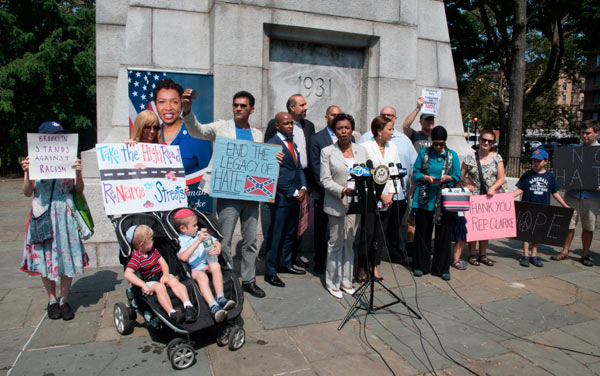Rep. Yvette Clarke (D–Flatbush) intensified her campaign to rename streets in Fort Hamilton named after Confederate generals Robert E. Lee and Stonewall Jackson when she introduced federal legislation last week to rename any military properties and installations honoring Confederate soldiers and generals.
The “Honoring Real Patriots Act of 2017” would require the Department of Defense to rename the nationwide military properties and installations under its control that are “currently named after any individual who took up arms against the United States during the American Civil War or any individual or entity that supported such war efforts,” according to the text of the bill.
The streets, facilities, and properties must be renamed because they embolden white supremacists and represent a dark period in our nation’s history, as well as the continued oppression of African Americans, Clarke said in a statement referencing the recent deadly protests over Confederate statues in Virginia.
“Monuments to the Confederacy and its leaders have always represented white supremacy and a continuing attempt to deny the basic human rights of African Americans,” she said. “As recent events in Charlottesville, Va., have made perfectly clear, these monuments are nothing more than symbols of white supremacy and a pretext for the violent imposition of an evil ideology that should never have persisted into the 21st century.”
Clarke also said that the street names in Fort Hamilton in particular are a particular affront to the troops who are stationed at the base.
“For hundreds of thousands of Brooklyn residents, as well as troops stationed at Fort Hamilton who are prepared to fight for this nation, the monuments are an insult,” she said in the statement.
Other members of Brooklyn’s congressional delegation have co-sponsored the bill, including Rep. Nydia Velazquez (D–Red Hook), Rep. Hakeem Jeffries (D–Fort Greene), and Rep. Jerrold Nadler (D–Bensonhurst).
On Aug. 22, Velazquez and Jeffries joined Clarke for an outdoor town hall at John Paul Jones Park next to the Fort Hamilton army base to draw attention to the bill and drum up public support for the renaming of the streets.
Supporters carried signs with slogans such as “Not my general,” “No Nazis in our White House,” and “Take down these hateful monuments to slavery.”
One supporter said that he believes the streets should be renamed to reflect the fact that the Confederacy was on the losing side of history, not just the Civil War, and its monuments foster national division.
“The Civil War represented a divide in America, and a house divided against itself cannot stand,” said Jordan Bratton, a Long Island resident. “I think the Confederacy is a representation of a time that is long past, and I feel like it’s time to move on.”
A small group of counterprotestors disrupted the town hall about 20 minutes into the remarks. The most vocal counterprotestor, clad in a shirt and hat bearing President Trump’s campaign slogan, said he was there not to protest the renaming of the streets, but to defend President Trump and the Republican Party who he felt were unfairly left out of the event, though no Republican members of Congress co-sponsored Clarke’s bill.
“I will celebrate [if the streets are renamed],” said Gary Phaneuf. “That’s not my issue at all. I had a hunch, which proved correct, that it was a partisan, Democrat, no Republicans invited, event.”
Congresswoman Clarke formally petitioned the Department of the Army to change the names of the streets earlier this year — along with Velazquez, Jeffries, and Nadler — but the Army responded in a July 20 letter refusing to do so, claiming “any effort to rename memorializations on Fort Hamilton would be controversial and divisive.”
At the town hall on Tuesday, Clarke said she was not deterred by the Army’s initial refusal to rename the streets because she thinks there is strong enough public outrage and greater public consciousness regarding the harmful impact of Confederate monuments following the violence in Charlottesville.
“I think people have not realized just what kind of harm those symbols can bring to not only our physical well-being but also to our spirituality as a nation,” she said. “It’s a fault line, that division, that in the 21st century we don’t want our children inheriting.”



















